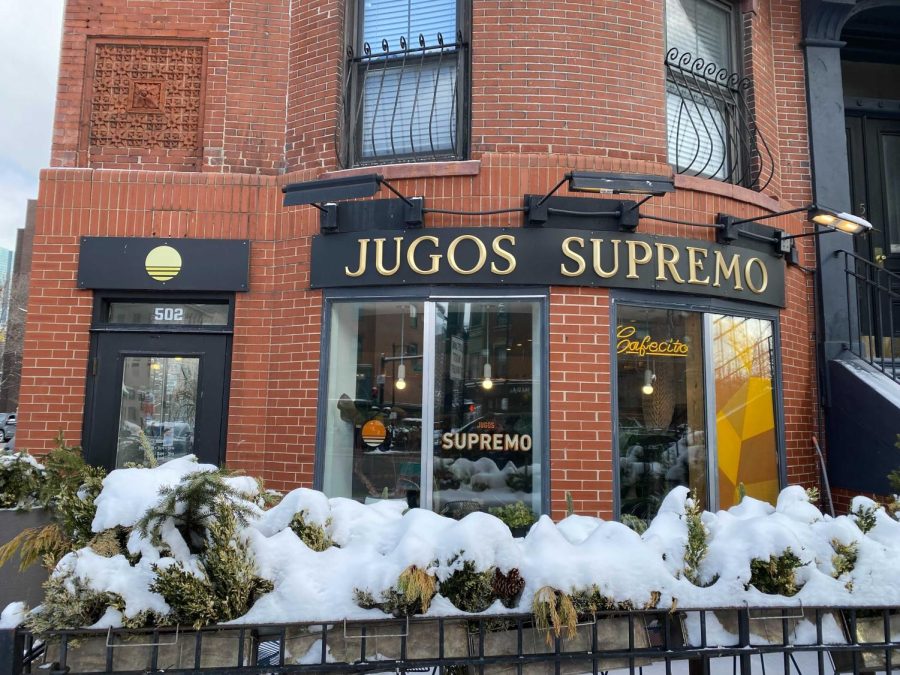Boston juice bar brings fresh options with a Latin touch
Jugos’ South End storefront on the corner of Massachusetts Avenue and Tremont Street. The juice bar serves up a variety of fresh breakfast options. Photo credit to Kathryn Manning.
February 14, 2022
When Ron Marcos moved from New York to Boston, he noticed something was missing: juices.
“Over [in New York], it’s anywhere from juice bars to a bodega with a juice counter,” Marcos said. “Here in Boston, I couldn’t access it, so I figured it would be something I could bring to the market.”
Marcos began planning in late 2011 and by Valentine’s Day the following year, Boston had its first dedicated juice bar. Jugos, originally called “Juice” but renamed to its Spanish equivalent a year later, has two locations. The Back Bay location is takeout-only, right next to the Back Bay MBTA station, while the South End location, Jugos Supremo, offers a sit-down space.
The menu features a variety of smoothies, juices and coffee, along with food selections including Latin-inspired sandwiches and salads. The shop also has acai bowls with toppings including chocolate sunbutter and figs.
This selection was what inspired Shilpa Satish, a customer who lives in Boston, to order delivery from Jugos.
“It was a Saturday morning and I felt like having something fresh and healthy. Out of all the options [on Uber Eats], they had the most variety,” Satish said.
However, the Jugos menu was not always so vast. While the pandemic caused many restaurants to cut down on their offerings, Marcos went the opposite direction. He expanded the menu to adapt to a changing clientele, one with far less commuters than before. Without the foot traffic of rush hour that would bring in hundreds of people each day to the tiny Back Bay shop, Marcos had to figure out how to evolve.
“Now, people will come into the city less and the ones in the city don’t use the train as much. We’re trying to be creative about what kinds of things we can offer that we didn’t offer before. Instead of coming in for smoothies, you’ll come in for an egg sandwich in the morning,” Marcos said.
Jugos’ most popular egg sandwich is “La Positiva,” with scrambled eggs, avocado, cheddar cheese and a crema on sourdough bread. Just five ingredients, but five ingredients picked with care.
“We’re really careful about making our scrambled egg the right way: not overcooked, nice and silky. We use cheddar and avocado, which is used a ton in Latin America [and] spread on the bread. Then we have the aji amarillo crema that we make in house and it’s served on sourdough, which is from a local bakery we’ve worked with for years,” Marcos said.
Marcos connects the food he serves to the community and the heritage behind the ingredients. He talked about their pan sobao, a pillowy bread ordered from Puerto Rico and finished baking at their South End location. He explained that their arepas, a flat cornmeal cake, are handmade by an employee from Medellín, Colombia, and taste nothing like the mass-produced arepas one might find at the supermarket.
“When we decided that [arepas] would be a good item to put on the menu, we really had to source it right,” Marcos said.
Everything on the menu is created from scratch, and Marcos ensures it all has a Latin touch. He also said he draws inspiration from pop food culture, creating items that will resonate with his customers. Marcos said he wanted to cater to Boston’s Colombian community, offering arepas on the menu that would taste like home.
“I don’t want to try to serve something that’s not authentic to the culture here in Boston. We shouldn’t do something that’s not in touch with the community,” Marcos said.
This extends to the ambiance of the stores as well. Both Jugos locations have bright, white tiles, vibrant accents and fresh produce on display. Marcos believes that a store is not about just selling food and that it should “feel organic when you experience whatever we’re doing.”
Kristine Aleksandrovica, a fourth-year business administration major at Northeastern University, experienced that connection for herself when she went to the Back Bay location.
“I really liked it. It tasted natural, and it was a juice without any of that Jamba Juice type of stuff. It smells like natural food in there, like the actual veggies and fruits they’re using,” Aleksandrovica said.
She said she appreciates the lack of artificial flavors in her juice without ingredients like syrups or ice cream. Marcos said he does not skimp on using the right kind of ingredients, ones that are high quality and sourced from purveyors with the same standards.
He said how important authenticity is for Jugos. To Marcos, this means having his business feel “as close to real,” whether that’s a customer’s real experience in another country or the taste of real produce.
“Most of the people who work here have Latin American backgrounds,” Marcos said. “One of the things that we try to emphasize is to not be robotic, so when you eat something, it tastes good because a real person actually made it like they would for a guest at their home.”
He said that while “everybody could put berries in a blender and hit power,” Jugos stands out because of how it’s much more than just another smoothie shop. The experience is just as important as the product it sells.
“It’s just about making sure it feels right, even though it’s a combination of different experiences blended into one,” Marcos said. “It’s like when you get a person from Venezuela who walks in and they know what it feels like to be home. Like ‘Oh, this is what I get back home.’ This is how it should feel. If it’s real to them, then we’ve done it right.”







